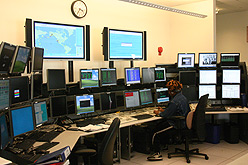Berkeleyan
IST has recovery on its mind
![]()
| 18 January 2006
 From this bank of monitors in 2195 Hearst Ave., staff check the status of central-campus systems on the mainframes and servers in the Data Center. The building is engineered to withstand a significant earthquake, and the center boasts state-of-the-art environmental controls, backup power, and security for central-campus systems and those of departments who choose to house servers there. (Sean Glynn photo) |
In the event of a disaster, will the Berkeley campus be able to maintain a presence on the Internet? Communicate with its constituents? Process checks? Pay invoices? Access students records? Handle class registration? Retrieve research data?
Information Systems and Technology's (IST) recent move from the flood-prone basement of Evans Hall to newly constructed 2195 Hearst — which has state-of-the-art security, backup power, and sophisticated environmental controls — improves the prognosis exponentially. Equally critical are pulling people together to do planning and then testing those plans. That job falls to Nina Hundley, IST's business-resumption coordinator.
IST performs daily backups of the campus's central administrative systems, delivering the tapes to a commercial storage facility outside Sacramento. Additionally, says Hundley, it has a contract for recovery services with IBM — which it can call upon, in an emergency, to restore critical computer systems.
Many players, from programmers to end-users, must be brought together to develop and test complex protocols for restoring campus systems in an emergency. With so many demands on people's time and limited resources, the process is a long and ongoing one.
Last June, IST staff had 48 hours to recreate relevant portions of the Berkeley computing environment on computers located in Colorad, and use backup tapes to produce a simulated campus payroll. They succeeded.
"It was an incredible accomplishment," Hundley says, calling the experience one of the highlights of her 20-plus year career in computer systems.
In 2006, Hundley plans to test the campus's accounts-receivable recovery plan and the Office of the Registrar's student systems. One system left to test is Berkeley Financial System (BFS) — "which is huge," she says. "There are many, many pieces."
For Hundley and others on campus concerned with business-resumption preparations, recent events in New Orleans have added a sense of urgency and offered sobering lessons.
"Unfortunately, a lot of universities were able to learn a lot about business resumption from what happened there," she says. Katrina hit in late August, at the onset of a semester. "Student-information systems were very critical; they had to dispatch students to schools across the country."
But planning for a disaster of unknown dimensions is not an exact science, she concedes. "Our needs are going to be totally different in the middle of summer than at the end of August. Tulane was hit right at the beginning of the semester. Their mailroom was in the basement, and they had tuition checks floating in the water that they had to recover."
She notes that UC campuses have the advantage of being part of a larger system, and that IST and its counterpart at UCLA are currently working on a mutual-assistance plan.
Computing assistance for departments
All of the systems that IST is testing under Hundley's guidance are central-campus systems. That still leaves unaccounted-for a significant portion of the campus computing environment — the portion operated by individual schools, departments, and research units.
IST's Central Computing Services unit offers a number of services to help campus users protect their work (call the IST–CCS Service Desk at 642-4920 for detailed information).
Services include:
• Colocation: Departments can house their servers in IST's state-of-the-art Data Center for about $8 per rack unit per month; varying levels of service are available. A description is provided in an IST iNews article found at istpub.berkeley.edu:4201/bcc/Fall2005/ dccolosvc.html.
• UC Backup: To protect users from data loss, IST provides centralized workstation backup support over the campus network. Data is sent directly from the user's workstation to a backup tape. Fees are highly competitive, and use of the service has been growing rapidly. For information, see ucbackup.berkeley.edu:9180.
• Storage, server administration, database administration, and firewall services are available as well.

